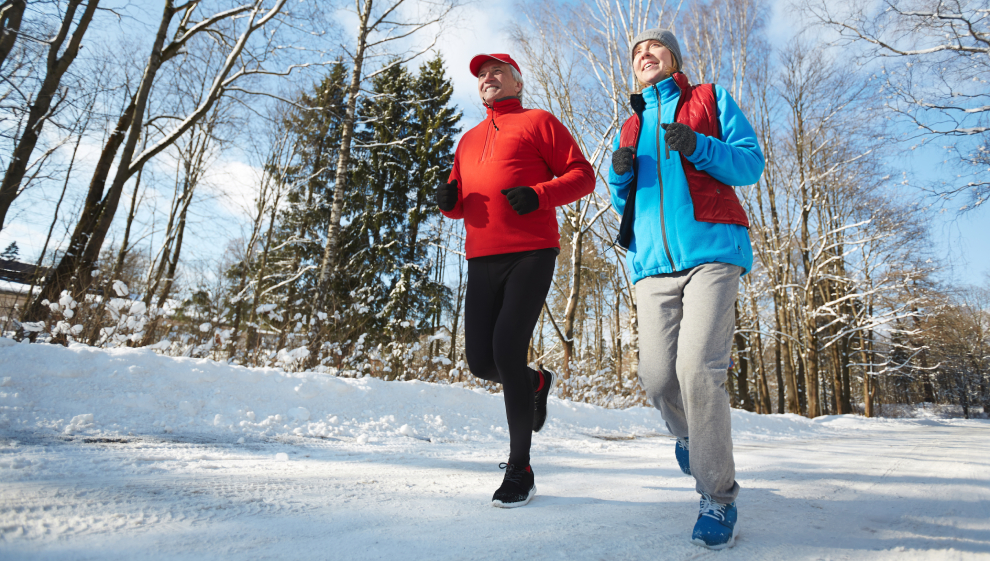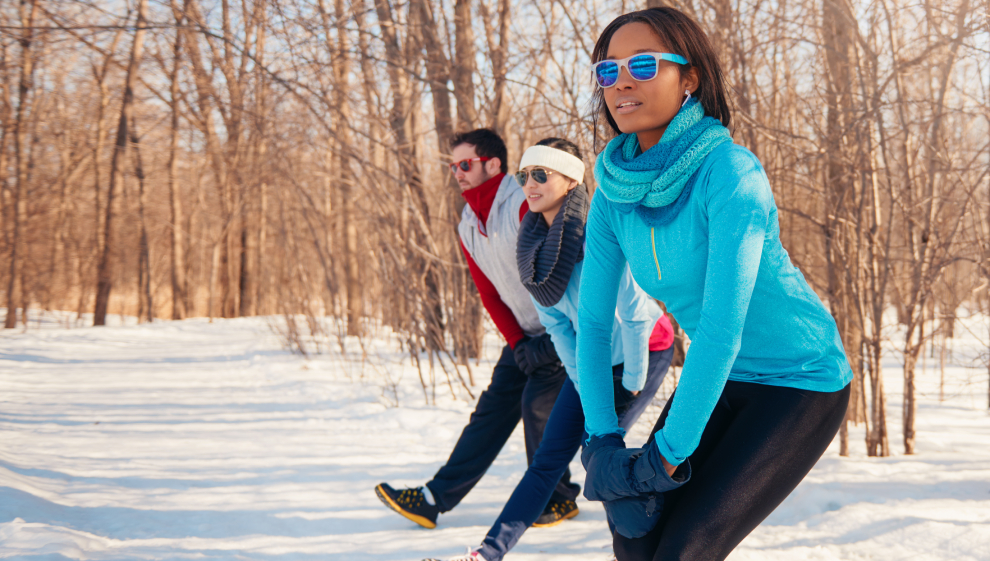4 tips for winter training
It can be difficult to know where to begin as exercising in cold weather requires different techniques, and more emphasis on certain training elements to prepare the body.
This extra effort may affect your motivation, so make sure that when you feel your enthusiasm wavering, you remind yourself of the reasons why you wanted to exercise in the first place. Nothing will motivate you more than steadily progressing towards your long-term goal.
Benefits of winter training

Regular exposure to the cold when training causes your metabolism to switch from burning carbohydrates for energy to burning fat.
This is because your blood vessels narrow in the cold, making your heart and lungs work harder, while increasing the amount of oxygen your body can consume during physical exertion (also known as VO2).
This means you can burn more fat during colder periods, whether this is training in winter, or using cold showers and ice baths.
Maintaining cold weather training can also increase endorphins and noradrenaline, the feel-good hormones, which can help with seasonal depression. So the more you stay active in cold conditions, the better you're likely to feel.
1. Warming up is essential

Cold weather lowers the body temperature and affects the nervous system, which can impact your performance. Your reactions start to slow as it becomes harder to generate a muscle contraction, and your body finds it harder to keep everything firing on all cylinders.
However, when you warm up properly, oxygenated blood starts flowing around the body, joints start to loosen, and muscles start to activate. Body and muscular temperature raises, which increases your flexibility and decreases your risk of injury, preparing you for exercise.
Keep in mind that the colder the weather, the longer you may need to warm up. Make sure you mobilise every area such as limbs, abs, back and shoulders before going into the main phase of your workout.
It's essential that those with heart conditions and asthma warm up before exercising in cold weather as the body is put under more stress. Getting the blood pumping around your body and heating up your core temperature can prevent heart conditions and asthma from worsening.
And don't forget to dress warm. Wrap up in layers to lock in the heat you generate through your workout. And cover your extremities with a hat, gloves and scarf to prevent valuable heat from escaping.
2. Stay hydrated
Hydration in winter is so important. When it’s cold and wet outside, many people think that they don’t have to drink as much, but that’s not true.
During the colder months, our thirst response is reduced, which means we are less likely to feel thirsty naturally due to our blood vessels narrowing, which keeps our body heat closer to our core. If we don’t drink enough water, we are likely to become dehydrated, which in turn leads to a drop in training performance and risk of injury.
There are other contributing external factors as to why we need to drink water and stay hydrated. We wear more layers in winter, making us sweat more. We are more likely to lose water when we’re breathing through vapour (when you can see your own breath). Sweat also evaporates quicker in cool air, so we think we aren’t sweating when we actually are.
3. Find ways to stay motivated

When setting goals, make sure that they aren’t just measurable, but also realistic. Identify both short and long-term goals to help keep you motivated. Setting some short-term targets, which could be achieved in one, two or three months, will provide a sense of achievement as you work towards your longer-term goals.
Often making goals realistic is the first obstacle. If you are someone who has never run before, don’t set a target to run a marathon in eight weeks. Habits need to be built over time. Setting targets and not achieving them is more likely to discourage you and lead you back to bad habits.
Avoid doing activities you find boring. Try a new exercise class or train with a friend to provide that added social element to your routine. Seek professional advice – personal trainers have the knowledge and expertise to guide you to achieve your goals quicker and more efficiently. You don’t have to commit to weekly sessions, but ask for help in setting up a training programme.
Remember to celebrate your achievements. When you've done something you didn’t think you could, or reached one of your targets, make sure you acknowledge it. You've been working hard to reach that point, whatever level you're at and you should be proud!
4. Bring exercise into your everyday life
There are many things you can do in your day-to-day life to increase your fitness levels. Small changes can make a big difference. An easy rule to follow is to get up every 90 minutes and stretch your body by heading to the kitchen to make a cuppa or nip outside to get some fresh air. Your body will thank you.
This year, Nuffield Health has been encouraging everyone to #Find5 minutes a day where you can take time out to concentrate on you physical and mental health. Whether that’s doing quick five-minute exercise routine in the living room, a five-minute meditation or spend five minutes doing some vigorous hoovering, it will all contribute towards your overall wellbeing.
Last updated Tuesday 20 December 2022
First published on Tuesday 20 December 2022

